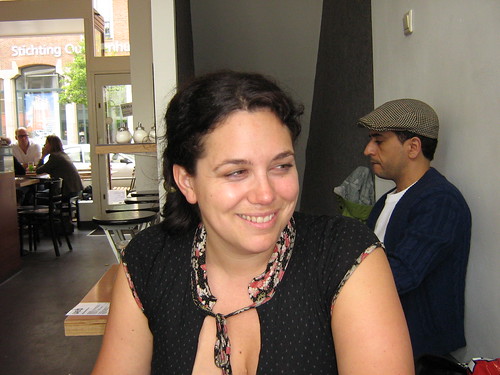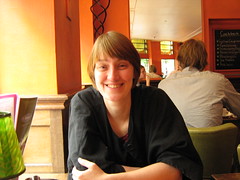So, more from Marianne… First her account of how she encountered the internet:
The Internet came into view in 1993, when I attended the famous Hacking at the End of the Universe camp (the HEU, as it is called) in a Dutch nowhere land polder, organized by the hacker-techno-anarchists of Hacktic (later called Xs4all, still my Internet provider, and I am proud that my e-mail adresses at Hacktic and xs4all are still working. I was there with my tent and laptop to write an article for De Groene about the hacker movement. Man, what fun did I have there! Hundreds of tents on a site, lectures, workshops and demonstrations in bigger tents, 300 public computers connected to the Internet, 1000 boys and 10 women/girls camping, talking, internetting, listening, laughing.
I notice that even then, there were far fewer women, but interestingly, Marianne felt the following way:
The amazing thing was that the atmosphere was really like what I knew of women’s festivals – I came right out of the women’s movement, and here there were boys and men all over the place, sharing their stuff and experiences, discussing how to get human right violations reports out of Gaza over weak telephone lines, how to get rid of the fascists on their bulletin board systems without betraying their principle of freedom of speech, talking about Gopher (the text menu based navigating system, no web yet) and newsgroups and mailinglists and FTP.
From here we talked further about gender stuff and Marianne had some interesting observations. I’m not sure a man who did not know how computers worked (who was not a nerd) would have felt any different than what Marianne describes below.
Mm, my prior experiences with computers did not really impress me. At school ‘computers’ were something unseen, a hobby of a few boys with the wrong clothes, who went studying math and physics. Classical nerds, and at that time ‘nerd’ was not associated with anything sexy or fun at all. When I studied psychology I had my first hands on experience with computers: mainframes behind glass…(the typewriters connected to the computer did not even have screens). I did not have a clue what I was doing and it did not interest me at all. … no, not my cup of tea. For that matter, just a classic women stance towards computers.
The first time I had an idea about computers was again at the research institute were I worked, actually before they bought the word processors. In the hall there was a piece of furniture I did not understand. It was a huge table, in which a kind of typewriter was built in. No one used it, it was just standing there. I asked other people what it was, no one knew, but one day the publisher visited the insititute, he saw the thing and he told me that it was a word processor, on which you could save and edit text. And that is was a shame that the institute did not know how to handle it. At that moment I got a glimpse, I had a idea what could be done with such a device, I have been involved in several feminist magazines as a volunteer, and some of these we had to typeset ourselves at the printing house. … Though there were ways to correct a letter or a word, you usually ruined the rhythm of the words and the sentence cause the font types were proportional, there was not enough space or too much space after deleting and then inserting a new letter. I realized that this problem would be solved with a word processor.
So in that sense my computing education is ‘classical feminine’: I did not see anything in computers as long as it was about calculation, but when it turned out to be about writing, language and typesetting I got it. Of course, this is a tricky stereoptype male=calculation, language=female, but it worked for me. I have to admit that I used this stereotypical argument in my book ‘Internet ABC voor vrouwen’ (Internet ABC for women, 1995) to convince women they had to get their hands on this stuff, because otherwise the Internet would remain a toy for boys. My message was basically: don’t be afraid, the Internet it is more about language and communication than it is about computing and technology. I am still a bit ashamed for that argument… But it worked.
I really question the way we use this stereotype of pragmatism versus play. Marianne and others have said they cared about tech once they saw it could help them do something they wanted to do, and they seem to think this is more how women think, while men use tech more often for playful reasons. But This distinction rests on what we define at “just for fun” or “for a serious purpose” and no one seems to question those categories.
Oh, I suddenly remember another ‘computing’ experience which was perhaps also crucial. Actually, I would not call it computing, but it definitely had to do with micro-electronics and chips. I was playing in a punk band, and in Amsterdam Michel Waisvisz from STEIM (institute for experimental electronic music) had designed a so called crackle box, a very primitive synthesizer which did not have a keyboard as interface, but turning keys and a metal plate on which you laid your fingers. The resistance (temperature, moist. movement) of your fingers was then translated by VOC’s (I don’t remember what it meant, voltage operating circuits or centers, I think – anyway, they were computer chips) into eh… sound, noise, great noise! But you never knew before what noise 🙂
To me, this sounds like just the kind of playful appreciation usually attributed to men.
I wanted to play a crackle box too! … I went to STEIM and they gave me the drawings, the schemes, and a list of stuff needed: transistors, VOC’s, and all kinds of other tiny little things you had to buy in a radio hobby shop. I had a friend who was deeply into electronics and soldering, and he taught me how to do this. I have ruined so many chips and two print plates by my unexperienced soldering! Eventually we never did a gig with the crackle box, it blew itself up all the time, and that was completely my fault since I changed the original design: I did not want to work with batteries but with a transformator and ordinary net current… Which was pretty stupid, since the thing worked by direct touch contact. I have had my portion of electroshocks…
I think for me the point was, both with the word processor and the crackle box: if I have an idea of what I want to accomplish, and if I have the idea that this can be done with a technology on which I can lay my hands on, which I can appropriate, adjust, tweak, then I am into technology. I am not a hacker, of course, but I always liked the old hacker’s slogan: hands-on! Because it is both literal and figural a matter of hands-on, both with the crackle box and the computer (which’ most important interface is the keyboard, and not the screen.) Strange enough such a basically pragmatic drive is not usual in women. I at least had no women friends who have the same fun in appropriating technology.
So Marianne seems to have really gotten into a kind of hardware hacking, or even circuit bending, which again is usually assumed to only be interesting to men. And she even describes this as atypical among women. I talked to her further via email about this, so I’ll get into that in the next post, as well as finally getting to the in-person interview! –and if you think this has been long (even though I edited out a lot) just wait a few entries until I get to my interview with Florian Cramer, which I managed to actually record. Or rather he did. 😉


